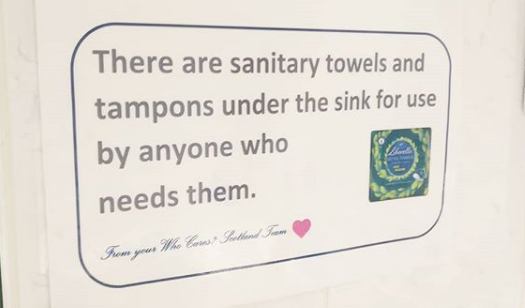ACEVO’s communications officer Heloisa Righetto raises the flag for period-friendly workplaces and talks about why period-friendly policies are part of creating inclusive workplace cultures.
I’ve recently been to the office of Who Cares? Scotland in Glasgow, and, to my delight, I came across this sign in the women’s loo:

I was taken aback. I am so used to seeing pads/tampons vending machines in women’s loos, including in workplaces, that this seemed too good to be true. Free! You just take it! Like toilet paper! No need to walk around the office whispering to your colleagues ‘I just got my period, do you have a pad?’!
Because of this iconic loo moment, I found out that period products are now available for free in every Scottish government building, including in men’s toilets. This a big step to tackle period poverty, and I firmly believe that the charity sector should follow suit and become a reference for other sectors.
As Precious Sithole recently mentioned on her blog about starting a civil society revolution,
One in five of the UK population live in poverty — and what is even more alarming is the fact that the number of workers living in poverty now sits at four million, an increase of half a million over just a five-year period. All you have to do is carry out a little probability analysis, and you will promptly arrive at a conclusion that some of our staff and/or volunteers are included in these poverty statistics.
Period activism is complex and takes many forms. The recent Oscar-winner Netflix documentary ‘Period. End of Sentence.‘ (which apart from being great has the best title) is an eye-opener for those who have never heard of period activism or period poverty before. Even Meghan Markle has embraced the issue before her royalty days, and activist and writer Jennifer Weiss-Wolf has written a book that talks about the subject in a holistic way (it is a must-read for those who want to get involved).
But the complexity of the subject shouldn’t be an obstacle – we can start making some simple and effective changes and maybe trigger a domino effect. Charity leaders can make sure they offer inclusive workplaces. Here are a few suggestions:
- Bathroom: How is the loo situation at your office? Is there a bin in each toilet for pads and tampons to be discarded? Is there a private sink for those who need to wash their menstrual cups?
- Free menstrual products: No one would ever think about asking employees to buy their own loo rolls, so the same idea should be applied to disposable menstrual products – as both things are used to manage bodily fluids. Moreover, as women get paid on average 8% less than men in the charity sector and the average lifetime cost of having a period is £4,800, we can’t wait for equality to finally kick in (although that will be a good day) to provide what is a basic human need.
- Flexible work: This is not something new or that should be applied to ‘special conditions’. Flexible working hours (and places) bring many mental health benefits and allow people to have a better personal/work life balance, regardless if they are parents or carers, or have a disability. As half of the world’s population menstruate and 80% of them experience period pain at some stage in their lifetime, knowing that they can stay at home or that they can work extra hours some other day is a huge relief.
Doing all of these things is not only a way to #BalanceForBetter but it is also a political tool. Talking about cis women’s bodies and bodily functions is a way to raise their voices and bring their needs to the public realm. As Weiss-Wolf says, if we talk about menstruation we are building bridges to talk more openly about choices.
(I would love to know if you work in a period-friendly office or if you are planning to take action following this blog. Please get in touch!)
Author’s note: I am a trans-inclusive activist and this blog does not suggest that periods are restricted to women. I know that there are women who don’t have periods and men that do, and I know that each person is entitled to define their gender and what makes them woman, man, non-binary or gender non conforming. I know that there are women who perceive their periods as part of their womanhood, and I respect that. We are all different. Let’s celebrate that.
Image credits – Creator:Natalia Lavrenkova – Credit:Getty Images/iStockphoto


